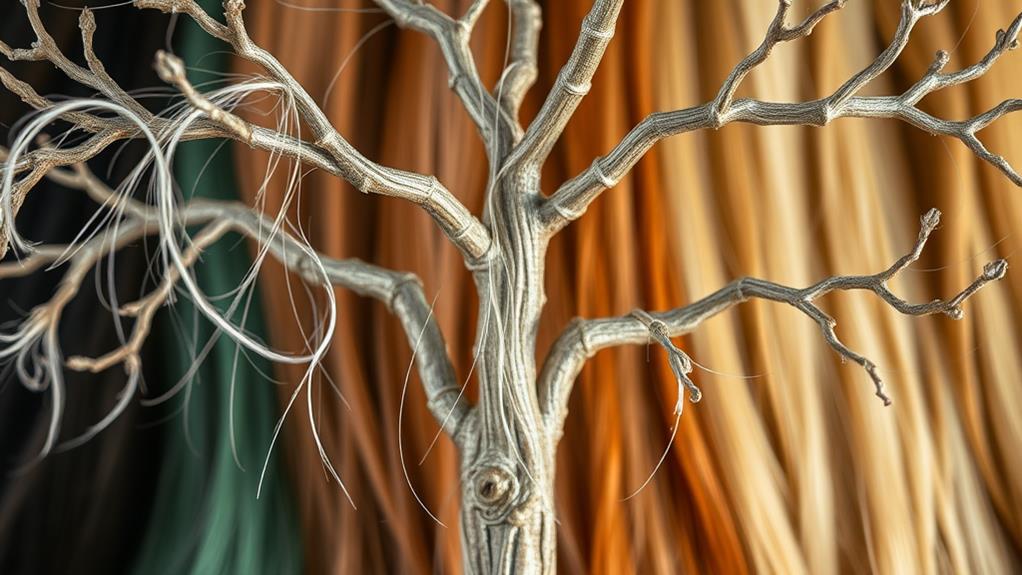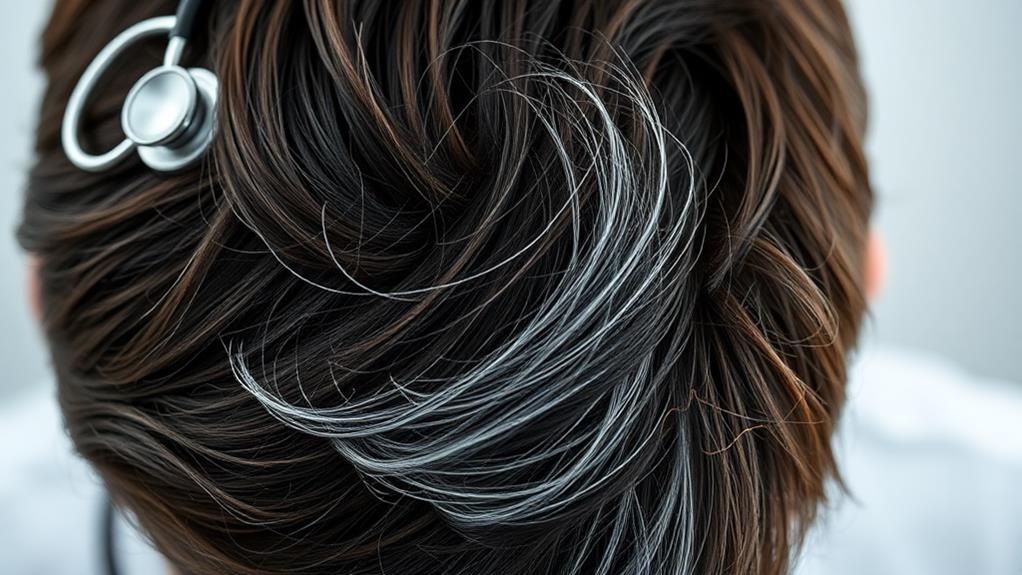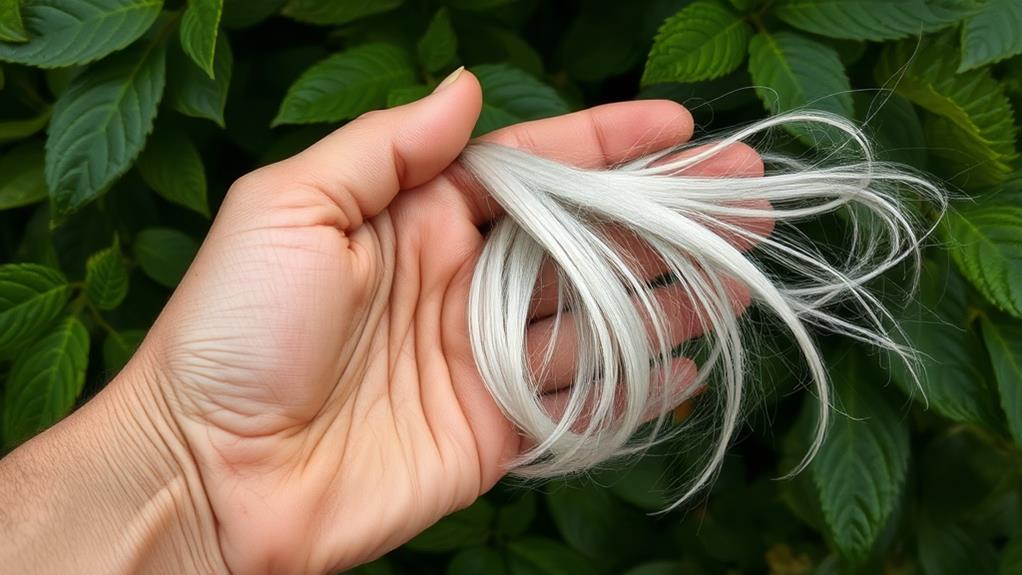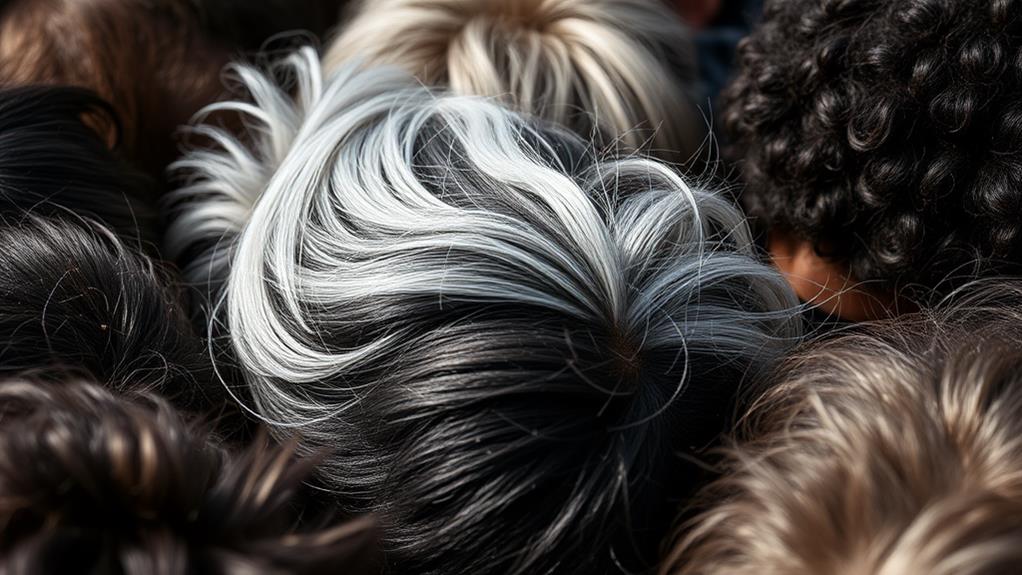You might have noticed your first strands of white hair appearing sooner than expected, leaving you to wonder why. It often turns out that genetics play a major role, but that's just the tip of the iceberg. Nutritional deficiencies, underlying health conditions, and even lifestyle choices can contribute to this phenomenon. Understanding the full picture could reveal surprising insights about your health and well-being. So, what exactly influences the timing of this change, and how can you address it?
Genetic Factors

Genetic factors greatly influence the onset of premature white hair, and if you have a family history of early graying, you might be more likely to experience it yourself.
It turns out that genetics play a big role in whether you'll see those early white strands. If your parents or grandparents went gray early, you could be next in line. Certain gene variants related to pigmentation loss are often passed down through families, making premature graying a hereditary issue.
Interestingly, the average age when people start spotting white hair varies by ethnicity. For example, Caucasians often see their first white hairs before age 20, while African Americans might notice them before 30, and Indians around age 25.
A specific gene, called the MC1R gene, has been linked to hair color and could affect when you start graying. The majority of these genetic influences are autosomal dominant, meaning if one of your parents has it, you've got a good chance of it too.
Nutritional Deficiencies
When it comes to premature white hair, nutritional deficiencies can play a significant role in your hair's health and pigmentation. If you're noticing those early strands of gray, it might be time to check your diet.
Key nutrients like vitamin B-12, folic acid, and biotin are essential for keeping your hair looking vibrant. A lack of these can lead to early graying, which isn't something most of us want.
Iron deficiency can also be a sneaky culprit. Low iron levels may contribute to those pesky white hairs popping up sooner than you'd like.
Plus, don't forget about antioxidants! They help fight oxidative stress, which can mess with hair pigmentation.
To help combat these issues, consider adding more fruits and veggies to your meals, as they're packed with nutrients.
If you find it hard to get enough vitamins from food alone, supplementation can be a helpful option.
Health Conditions

Health conditions can considerably influence the onset of premature white hair. For instance, autoimmune disorders like alopecia areata and vitiligo can cause your hair to lose its pigmentation. This means you might see those pesky white strands popping up earlier than expected!
Thyroid dysfunction, whether it's hyperthyroidism or hypothyroidism, can also play a role. Your thyroid helps regulate metabolism, which impacts melanin production in your hair follicles.
Another culprit is pernicious anemia, a condition that messes with your body's ability to absorb vitamin B-12. Since B-12 is essential for hair growth and color, a deficiency can lead to premature graying.
Then there's Werner syndrome, a rare genetic disorder that speeds up aging, leading to early graying.
Some health issues can increase oxidative stress, which damages the melanocytes—those little guys responsible for your hair's color. When they're harmed, you may notice more white hair.
Lifestyle Influences
In today's fast-paced world, lifestyle influences play a significant role in the development of premature white hair. You mightn't realize it, but stress can really mess with your hair. Chronic stress has been linked to the depletion of stem cells in hair follicles, which might lead to premature gray hair.
And if you smoke, well, studies show you're more likely to see those white hairs pop up earlier than your non-smoking friends.
Let's talk nutrition! If you're not getting enough vitamins and minerals like vitamin B-12, iron, and copper, your hair could suffer. Poor nutrition can cause vitamin deficiencies that hurt your hair's health and pigmentation.
Plus, exposure to environmental pollutants and harsh chemicals—like those colorful hair dyes—can damage your hair follicles and change your hair's look.
But don't worry! A balanced diet rich in antioxidants can help fight oxidative stress on your hair follicles.
Aging Process

Have you ever wondered why your hair starts losing its color as you age? Well, it's all part of the aging process! As you get older, your body slows down melanin production, the magic stuff that gives your hair its color.
Melanocytes, the tiny cells responsible for making that pigment, start to disappear over time. This is why white hair begins to pop up, often around your mid-30s. But don't worry too much—genetic factors and ethnicity play a big role in when you'll notice those strands of gray.
By the time you hit 50, about half of us have at least half gray hair. Surprise! But aging doesn't just affect color; it also changes hair texture and thickness.
So, you might find your hair feeling different too. Don't let the aging effects get you down! Embrace your silver strands—they can look fabulous!
Plus, taking care of your hair health can help it look its best, no matter the color. So, whether you're rocking a full head of white hair or just a few sparklers, remember: it's all part of life's beautiful journey!




